"I never say I'm a 100 percent sure or unsure about pretty much anything. People need to learn to operate based on this, and once they accepts this, they start to understand how science works," says the theoretical physicist and science communicator known as Vedátor, Samuel Kováčik, from the Faculty of Mathematics, Physics and Informatics at Comenius University in Bratislava. He is one of the authors behind the Vedátor project.
This article is supported by the ESET Foundation, whose annual ESET Science Award recognises exceptional scientists.
In an interview with The Slovak Spectator, he talks about how humane science communication can overcome misunderstandings in society, what to think about when communicating science, and why he thinks the Starmus festival can encourage people to study sciences.
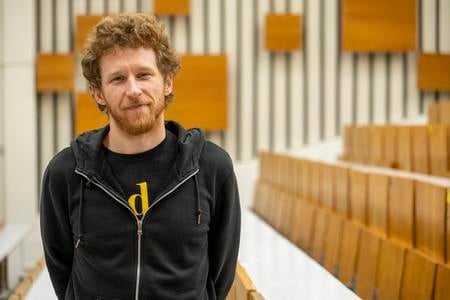
A recent survey revealed that 21 percent of Slovaks are unsure whether the Earth is round, while a further 20 percent have doubts. What do you make of that?
In my opinion, the problem is not that people are convinced that the Earth is not round, but that the idea is part of a wider approach embraced by people who want to be against the mainstream, or against something they label as mainstream, even though their counter-opinion has in some way become almost mainstream. It is a form of contrarianism, a rebellion of some sorts. The 20 percent should not be seen as convinced flat-earthers. If denying the chemical properties of wood were to become part of the rebellion against the mainstream, they would adopt it. The same thing happened with vaccines. I think part of the population would get vaccinated precisely if it were forbidden because they would deem it suspicious.
In the US, bird flu has broken out among cows. Experts are warning people not to drink raw milk. In a turn of events, raw milk advocates are actually seeking out milk that specifically comes from infected cows.
Throwing facts at people like that is pointless. Instead, we need to identify the source of their frustration. At the same time, and this is something we're only now catching up to culturally, people haven't learned to focus on themselves, understand their own desires, needs, and deal with them. Many people are born, they adopt dreams and desires from their surroundings, and go through life on autopilot, often without fulfilling their own dreams and desires, so they start looking for scapegoats.
It reminds me a bit of the 2016 debate between Brian Cox and Australian politician and climate sceptic Malcolm Roberts. Cox had prepared graphs, but it didn't seem to make any dent in Roberts' views.
At the very least, it’s good to show people who spout nonsense that is baseless and laughable. A good example can be SNS MP Rudolf Huliak, whom many people respect because they think he tells the truth. However, when his claims are dissected, it becomes clear that they are nonsense, that he doesn't understand anything, and such opinions don't deserve respect.
To stay up to date with what scientists in Slovakia or Slovak scientists around the world are doing, subscribe to the Slovak Science newsletter, which will be sent to readers free of charge four times a year.
Doesn't this run the risk of making such people even more entrenched in their views?
What he thinks doesn't really matter to me. But it matters a bit in the way that he has an influence on legislation. The point is whether he attracts others and inspires them, or repels them. I'm aware that the moment we start questioning his views that some people will automatically come to his defence. However, I think that in at least some extreme cases, when it becomes clear that the opinions a person presents are laughable, people will step away from that person. We've seen this happen in our [Slovak] politics.
What can be done about it?
During the pandemic, I came to like one thing. Although I couldn't address everyone because they don't follow Vedátor, I could convey information to followers so they could then pass it on to their loved ones. When I talked about vaccines, I kept in mind that I couldn't just talk tables and data, because it wouldn't work at the Sunday family lunch setting. What I talked about was based on data, but I extracted an easy-to-understand idea that could be passed on. I try to think about these things in this way: it's not about what I can tell people directly, but about how to educate those who follow Vedátor so that they themselves can understand the ideas and be able to convey them to their loved ones. And I feel that this works quite well. People who need to hear it trust their loved ones much more than they would trust me.
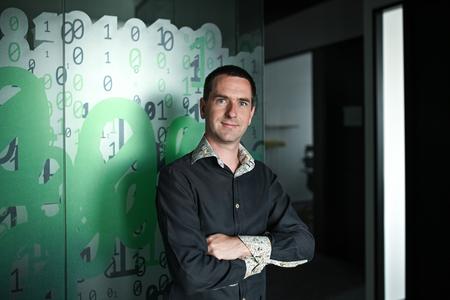
I recall a blog by a climatologist. In it she mentioned that bombarding sceptical people with facts didn't work for her because they perceived it as an attack on their identity. The best thing she did was talk about her Christian faith. It's as if instead of believing what is in front of some people they first needed a value-aligned person in order to recognise facts.
This is confirmation bias; we believe the things we already believe. If the heavens were to open now and angels started descending, it would also take me a while to accept it. First, I would need to rule out that it was a hologram, a hallucination, or other conventional possibility. When someone has preconceived notions about the world, they will reject anything that challenges them. Therefore, we need to approach this sensitively. When you start talking to someone like this and expect them to admit that they believed nonsense after two sentences, that is unrealistic. Such a discussion will take a long time. If they then say, "Well, maybe I don't agree with you, but I understand your point of view," that is a big step towards better mutual understanding and for society. We don't have to share the same ideas about everything. What's important is that we learn to understand other perspectives and then, the more angles we know, the more our confidence in what we consider as correct ideas increases.
How do you approach communicating a scientific idea?
The information on our website ranges from very specialised content for students in a given field to posts that attract 100 people, 90 of whom read, understand and can explain it in their own words. I don't have one specific approach, but several, to reach the widest audience possible. I try to absorb information from various sources and then select what to communicate. For example, we had an article about why it's so hard to kill a fly. In it you learn that time flows differently for a fly. But we also have articles on how to meaningfully talk about the origin of the universe. When I come across something interesting, I also ask myself whether it's suitable to talk about it in Instagram stories, a podcast, or a short article.
What kind of response do you get?
99 percent of people give very positive feedback. I have students who went on to study physics, astrophysics because they followed Vedátor. Many people often tell me they hated maths and physics in high school and now they regret it. People appreciate simplicity, clarity, and humanity. When it comes to a sensitive topic, I try to present it in a way that doesn't offend a person. For example, I don't respect the opinions of MP Huliak, which I find laughable, but he's still a human being, and I won't attack him personally; I just confront his views and avoid dividing society.
What if the other side doesn't want to listen?
I don't know. It's always tempting to say that if someone denies science, they shouldn't use its benefits—medicines, technology, computers, the Internet. It kind of shows that they use the benefits but deny the rest. So maybe point out the inconsistencies. There's a saying from The Art of War that in conflict it's important to allow the other side to save face. It's bad to corner an enemy because they might do something irrational. So, even when talking to someone who is 100 percent wrong, we need to give them a way to back out gracefully, without ridicule.
One of the objections against science I've encountered is that it constantly changes, and people don't know the truth. Simply put, people don't like uncertainty.
As a scientific community, the fact that science communication hasn't been given much attention for a long time is now to our detriment. As a result, people don't understand how science works.
For example, the difference between the colloquial meaning of the word "theoretical" and the fact that in science, a theory is the highest level of certainty?
Exactly. People think there are objective truths about this world which, once uncovered, don't change. A more accurate description is that we create models of how the world works, and based on new data and information, we refine these models. Newton provided us with a description of gravity that was accurate but had flaws. Einstein corrected some of these flaws, but others remained. And this is true everywhere. All the information we put out there has annoying footnotes saying that we rely on certain assumptions and data, and that the conclusion we draw has a certain level of certainty.
People are frustrated because they are used to the false notion of absolute certainties. It's important to learn to live with the fact that there are no certainties, but lesser and greater degrees of credibility in our predictions. I can say that tomorrow it will snow, rain, or be sunny. These are three different predictions, but not all are equally probable. There is about an 80 percent chance it will be sunny, a 19 percent chance it will rain, and maybe a meteorite will hit us, bringing Arctic air and snow, but the chance of that happening is minuscule. I never say I'm a hundred percent sure or unsure about pretty much anything. We need to learn to operate based on this, and once we accept this, we start to understand how science works.

In May, the Starmus science and art festival took place in Bratislava. In your notes, you mentioned the following: "I think that in 10 years there will be many science students who will say this was the moment that brought them to science." What led you to this statement?
I was presenting Starmus for Schools to high school and elementary school pupils. We had no idea how many would come or if they would listen. When I saw them, I wondered if the kids were just glad that they didn't have to go to school. Moreover, the talks were in English, and required a lot of concentration. When Chris Hadfield arrived, he asked to be taken to the sound engineers to crank it up to 11. I started to suspect that it would be interesting. His lecture started with a video about his career, including a rocket launch demonstration.
I saw some kids covering their ears because of how loud it was. And then they hung on every word he said. He talked about setting goals, breaking them down into manageable parts. When David Bowie's "Space Oddity" played, the kids pulled out their phones and waved them. I still get goosebumps just thinking about it. It was a combination of science and the message saying not to be afraid of big dreams, that things that seem unrealistic can be achieved. If there were several thousand kids, and only every hundredth decides to become a scientist, it would be enough.
Was this the sole situation like this?
Jane Goodall demonstrated the human dimension of science. People often think of scientists as boring people in lab coats. They might think they can't be scientists because they like to party. She showed that scientists are actually those who do what they love, what fulfils them possibly much more than people in corporate jobs. Science can have aspects that reach far beyond the human aspect, and in some ways embodies the values that we, as humanity, generate.
It seems to me that for people to get excited about science, they need role models who can do that. At the same time, it must be hard to find such people.
When I write for our website, I try to mention modern scientists who are still alive. This approach also helped me with book-writing. I used it to change the pace so that after a heavy explanatory section, there would be stories about such personalities. I wanted to show how they came up with their ideas and reached their results. When I write about science, it's more to show that science is a process and that people drive the process; so that the general public appreciates that computers, medicines, weather forecasts, rockets, and aeroplanes are the result of the work of thousands of researchers.
When a young person reads it, they might think they can do such things too. Last year, I did a podcast with Michel Mayor, and I asked him how he came to his discovery. He said he talked to someone about needing a detector, but since no one was doing it, he learned how to do it and made one. He then found someone who knew how to do something else, and then with a bit of luck, they found the first exoplanet. This, I think, is valuable information for young people. You don't need an IQ of 190; you need passion, which will make you enjoy and do it long enough to expose yourself to the possibility of coming up with a good idea.
How would you describe the significance of such a festival like Starmus?
It shows society that science is valuable, that it has meaning, and that interesting and inspiring people do it. It's much more interesting to talk about ideas than to analyse shows like Ruža Pre Nevestu (The Rose for the Bride). During the festival, I talked with people about what they agreed or disagreed with in a lecture instead of what we would usually talked about, which was great. It teaches people to discuss ideas they agree with or form their disagreement with the ideas presented.
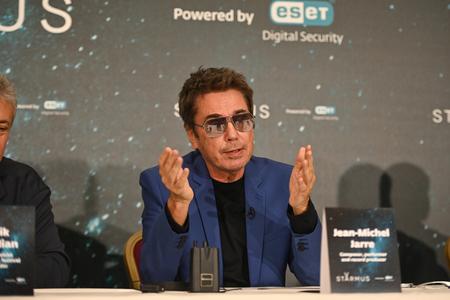
Starmus will likely remain a unique event in Slovakia for a long time. However, it seems to me that scientific institutions are trying to communicate more with people. Just last weekend, the Slovak Academy of Sciences (SAV) presented their work in the centre of Bratislava.
In the case of SAV, it’s a commendable gesture because they have known for quite some time that they need to approach the public. In this regard, we are somewhat making up for lost time, but several institutions have taken up the mantle with gusto. It's great that they are doing such things. We are finishing the fourth season of Vedatour lectures tonight [June 18 - Ed. note]. Outside of Bratislava, dozens of people usually attend a given lecture; in Bratislava it's more than a hundred. People come to listen and then genuinely ask questions because they are interested in the topics. I feel that this is gradually becoming part of everyday social life.
It's still not at the level that if one wants to attend a science event they just look for one online. I think in 10 years, popular science events will be an interesting form of socialisation, and people will have plenty of options even outside the capital. I held the last lecture for the book Obyčajné Zázraky [Ordinary Miracles] in the forest. It required a hike, but people came. I tried talking to everyone, and when I asked two guys how they knew each other, they said that they had met there at the event. It made me happy because it created a place where people can meet. When such events become more frequent and a supportive environment develops, these things will become more common.


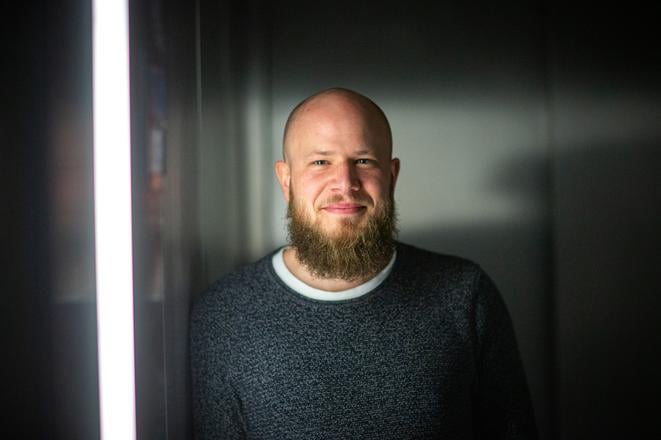 Samuel Kováčik (source: SME)
Samuel Kováčik (source: SME)
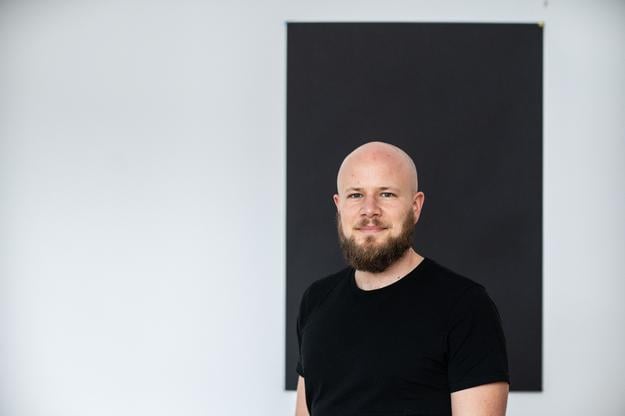 Samuel Kováčik. (source: SME - Jozef Jakubčo)
Samuel Kováčik. (source: SME - Jozef Jakubčo)